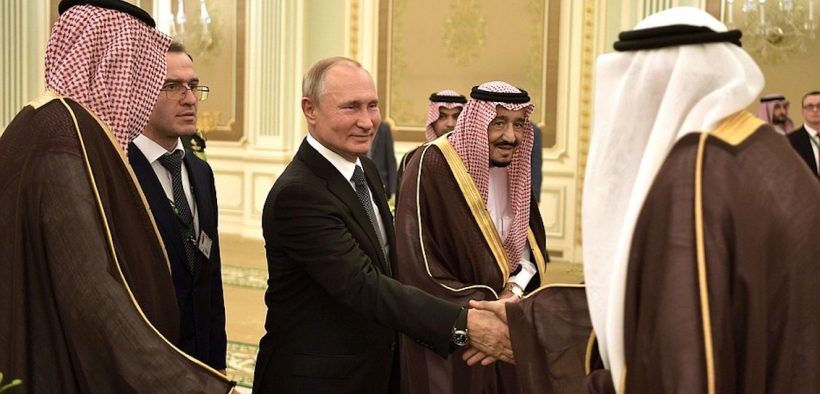Putin Chums it Up With Saudi Arabia in Historic Visit

“Russia sees the expansion of friendly and mutually beneficial ties with Saudi Arabia as particularly important.”
On Monday, October 14, Russian President Vladimir Putin made a historic visit to Saudi Arabia, the first since 2007, aimed at exerting Moscow’s role in the Middle East amid Russia’s strong military presence in Syria and energy ties with the oil-rich kingdom.
During the visit, Putin and the kingdom’s Prince Mohammed bin Salman (MBS) signed 20 multi-billion dollar contracts on energy, technology, health service, aviation and agriculture at the Al-Yamamah Palace in Saudi’s capital, Riyadh.
The Saudi kingdom’s Energy Ministry Prince Abdelaziz bin Salman stated that the agreement aimed at boosting ties between both countries and stabilizing oil prices.
The Saudi-Russian agreement came shortly after global oil prices hit their highest level in the past four months following two drone attacks on Saudi’s oil facility on September 14. One day after the incident, the Brent crude oil price jumped 19 percent to $71.95 per barrel, while the price of White Texas Intermediate rose 15 percent to $63.34.
Saudi’s oil giant, Aramco, claimed that the monarch suffered a 5.7 million barrels per day loss due to the attacks.
After leaving Saudi Arabia, Putin continued his Middle East trip to the United Arab Emirates (UAE) on Tuesday, October 15, to meet Prince Mohammed bin Zayed Al-Nahyan.
Moscow’s Growing Influence in the Middle East
Putin’s visit to Saudi Arabia is a significant marker for Moscow’s growing influence in the Middle East – perhaps the world’s most volatile region, often plagued by conflicts from the Israel-Palestine to the U.S-Iran tension following Washington’s withdrawal from the nuclear deal and the Yemen war.
The Russian leader’s Middle East tour came amid Washington’s decision to withdraw around 1,000 troops from war-torn Syria, abandoning the Kurds rebels once the U.S.’ ally in fighting against the Islamic State of Iraq and Syria (ISIS). Turkey then invaded northern Syria, fearing that the Kurdish’s growing power close to its border would threaten Ankara’s security.
Ahead of his Saudi trip, Putin expressed optimism that he could help to defuse the ongoing tensions in the Gulf, thanks to the Kremlin’s good ties with the Gulf Arab countries and Iran.
“Russia sees the expansion of friendly and mutually beneficial ties with Saudi Arabia as particularly important,” Putin said in a statement during his Saudi visit.
Putin defended Iran following accusations from the U.S. and Saudi Arabia that Tehran was behind the attacks on a Saudi oil facility on September 14, despite a lack of evidence indicating who masterminded the incident.
“It is wrong to determine who is guilty before it is known reliably and clearly who is behind this act,” Putin said, adding that he was willing to help investigate.
Three days after the attack on Saudi’s oil refineries rocked global oil prices, Russia offered its missile defense system to Saudi Arabia claiming it could help prevent such an attack from happening again.
“We are ready to help Saudi Arabia so that she can protect her territory. She can do so in the same way that Iran has already done in buying the S-300 Russian missile system and the same way that Turkey has already done in buying the S-400 Russian missile system,” Putin said in a press conference in Ankara
Is Russia Aiming to Become the Middle East’s Mediator?
Unlike the U.S., who has not wanted to talk to key players in the Middle East (like Syrian president Assad or the Iran-linked Hezbollah), Russia often welcomes dialogue with all parties in the Middle East (except militant groups such as Al-Qaeda and ISIS). Thus, the question arises: Is Russia angling to become a mediator for Middle East conflicts?
With the U.S. is in the midst of pulling troops from Syria, it could be an opportune time for Russia to step in. If both Washington’s allies and enemies put their trust in Russia, the U.S.’ influence in the Middle East could be on its way down, as a Brookings Institute January 2019 report warned.
Saudi Minister of State for Foreign Affairs, Adel al-Jubei, dismissed the idea that Putin’s historic visit to Saudi could undermine the kingdom’s ties to the U.S., stating, “We don’t believe that having close ties with Russia has any negative impact on our relationship with the United States. We believe that we can have strategic and strong ties with the United States while we develop our ties with Russia.”
But given the U.S.’ incessant drum-beating of a “Russian threat” will the U.S. really take kindly to a Saudi Arabian friendship with Russia?















